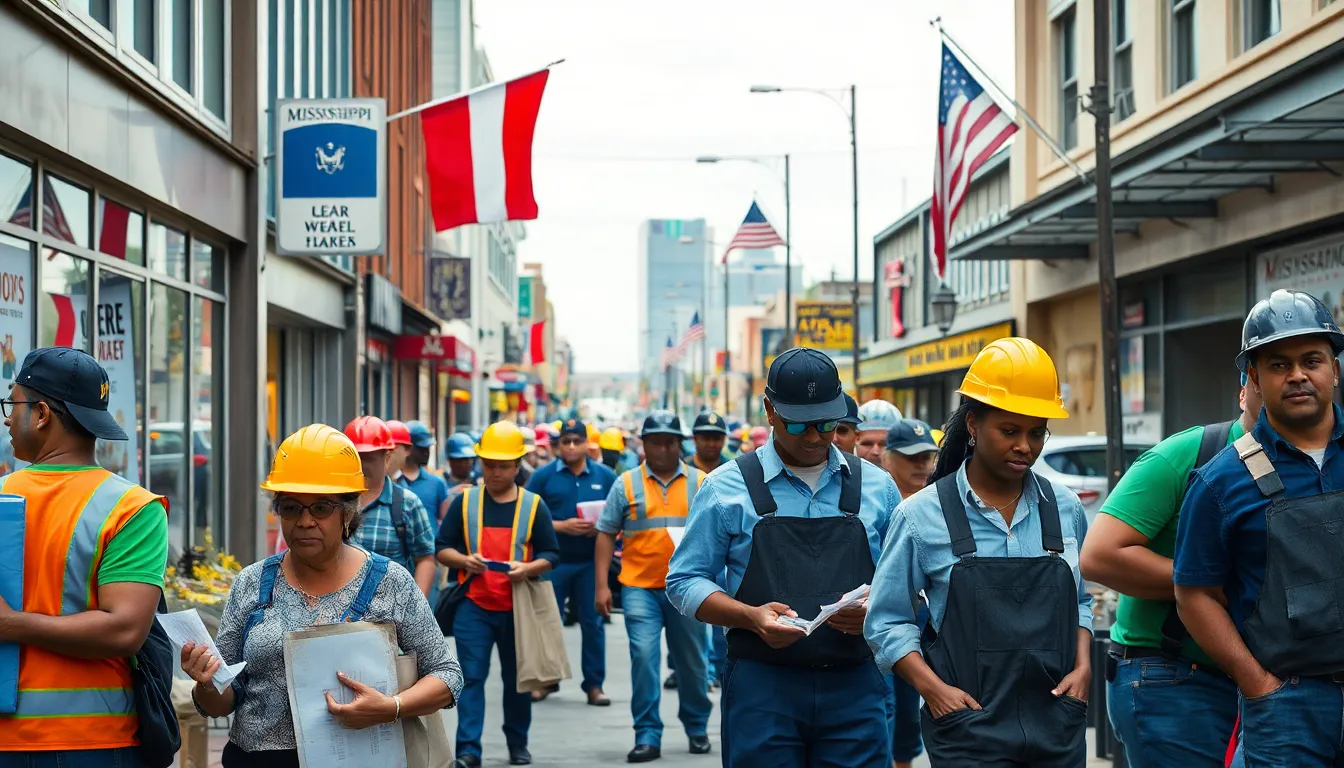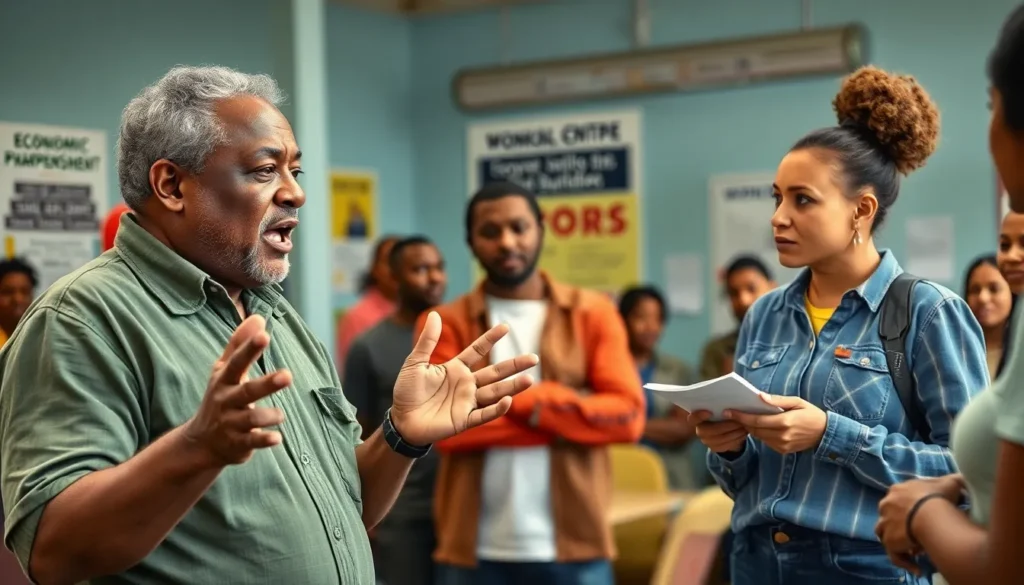Minimum wage laws play a crucial role in shaping the economic landscape of any state, and Mississippi is no exception. As one of the few states without a mandated minimum wage above the federal level, understanding Mississippi’s minimum wage is vital for both employers and employees.
Currently, Mississippi adheres to the federal minimum wage of $7.25 per hour, a figure that has sparked debates about livable wages and economic growth. This article dives into the implications of this wage standard, exploring its impact on workers, businesses, and the overall economy in the Magnolia State. Whether you’re a job seeker, an employer, or simply curious about wage policies, grasping the nuances of minimum wage in Mississippi is essential.
Table of Contents
ToggleUnderstanding Minimum Wage
Understanding minimum wage helps clarify its role in the economy of Mississippi. The current minimum wage in the state aligns with the federal standard of $7.25 per hour, effective since July 24, 2009. This standard sets the baseline for compensation for hourly workers across various industries.
Impacts on Workers
Impacts on workers include reliance on minimum wage for basic living expenses. Many individuals depend on this wage to cover necessities such as housing, food, and healthcare. Despite this wage, Mississippi consistently ranks among the states with the highest poverty rates, raising concerns about whether the current minimum wage sufficiently meets living standards.
Effects on Businesses
Effects on businesses involve balancing labor costs with profitability. Employers may face challenges in attracting and retaining talent when wages remain stagnant. Some businesses respond by cutting hours or limiting hiring, affecting workforce stability and productivity.
Economic Growth Implications
Economic growth implications arise from the relationship between minimum wage, consumer spending, and overall economic health. Higher minimum wages can increase purchasing power for low-income workers, potentially stimulating local economies. Conversely, concerns about job loss or increased operational costs linger for businesses responding to wage changes.
Legislative Considerations
Legislative considerations highlight ongoing discussions about revising minimum wage laws. Various proposals seek to increase the minimum wage to address concerns about living costs, but no changes have been implemented as of now. Understanding these legislative dynamics remains crucial for both advocates and critics of wage policy reform.
Current Minimum Wage in Mississippi

Mississippi adheres to the federal minimum wage of $7.25 per hour, unchanged since July 24, 2009. This wage affects many workers across various sectors, marking a significant aspect of the state’s economic landscape.
Comparison with Federal Minimum Wage
The federal minimum wage sets the standard for Mississippi’s labor market. Both the state and federal minimum wage remain at $7.25 per hour, reflecting no local adaptations or increases to address regional cost-of-living discrepancies. Comparatively, several states and cities have established higher minimum wage rates to better support workers facing rising living expenses.
Historical Changes in Minimum Wage
Mississippi’s minimum wage has seen few alterations over the decades. The last major adjustment occurred in 2009, coinciding with the federal standard. Historically, state minimum wage rates have often mirrored federal levels due to legislative decisions, limiting local efforts to increase wages independently. Various proposals to raise the minimum wage have arisen, yet no successful changes have materialized, maintaining the long-standing $7.25 per hour rate.
Impact of Minimum Wage on Workers
Minimum wage significantly affects workers in Mississippi, influencing both economic stability and social dynamics. Understanding these impacts helps clarify the broader implications for workers relying on this wage standard.
Economic Implications
Economic effects of minimum wage laws in Mississippi resonate throughout the workforce. The state’s adherence to the federal minimum wage of $7.25 per hour limits income potential for many workers. Low-income earners often face difficulty meeting basic living expenses, exacerbating poverty levels. Increased minimum wages could elevate workers’ purchasing power, stimulating local economies. Conversely, stagnant wages may reduce consumer spending, negatively impacting local businesses. The balance between fair compensation and operational costs remains a contentious issue, as employers weigh potential job losses against the benefits of a stronger economy.
Social Considerations
Socially, minimum wage directly influences quality of life for workers. Many low-wage earners in Mississippi struggle with access to essential services such as healthcare and education. A higher minimum wage could reduce reliance on social assistance programs, fostering greater economic independence. Additionally, increased earning potential can lead to improved mental health, decreased stress, and enhanced family stability. However, debates surrounding wage increases often reveal polarized views between low-income workers advocating for fair wages and businesses concerned about potential financial burdens. These social dynamics play a crucial role in shaping community engagement and overall well-being among residents.
Pros and Cons of the Current Minimum Wage
The current minimum wage in Mississippi, aligned with the federal standard of $7.25 per hour, generates various perspectives regarding its effectiveness and impact on workers and businesses.
Support for Minimum Wage
Supporters argue that maintaining a minimum wage provides a safety net for low-income workers, ensuring basic financial stability. They contend that minimum wage laws prevent exploitative labor practices and reduce income inequality by establishing a wage floor. Evidence indicates that higher wages can improve workers’ productivity and morale, leading to lower turnover rates. Furthermore, increasing the minimum wage can boost local economies by enhancing purchasing power, allowing workers to spend more on goods and services, which stimulates business growth.
Criticisms of Minimum Wage Increases
Critics highlight potential drawbacks of raising the minimum wage. They suggest that increased labor costs could lead to higher prices for goods and services, ultimately negating any financial benefits for workers. Some argue that employers may respond to wage hikes by reducing staff hours or laying off employees, which could contribute to higher unemployment rates. Additionally, small businesses often express concerns about their ability to absorb increased labor costs, potentially hindering their growth and sustainability.
Future of Minimum Wage in Mississippi
Future discussions around minimum wage in Mississippi will likely center on legislative proposals and public opinion trends. Several advocacy groups continue to push for higher wages. They argue that increasing the minimum wage to a livable standard would directly address poverty and support economic growth.
Legislative proposals aimed at raising the minimum wage have emerged, yet none have gained substantial traction. States such as California and New York illustrate how local governments can set higher standards, reflecting the rising cost of living. In contrast, Mississippi remains stagnant at $7.25 per hour. The lack of change highlights a need for dialogue among lawmakers, business leaders, and community members to address wage disparities.
Public opinion plays a crucial role in shaping the future of wage laws. Surveys indicate significant support among Mississippians for increasing the minimum wage. As the cost of living rises, many residents advocate for better compensation. Increased awareness of economic challenges may empower more citizens to engage in discussions regarding wage policy.
Economic studies consistently show a correlation between higher minimum wages and improved economic conditions. Some evidence suggests that increasing the minimum wage boosts consumer spending, which in turn, benefits local businesses. However, some experts caution that raising the wage too quickly could lead to unintended consequences, including job losses or reduced hiring.
Regional differences can also impact the conversation around minimum wage. Smaller cities and rural areas may experience different economic pressures than urban centers. Tailoring minimum wage discussions to reflect local economic conditions could encourage more equitable solutions.
Overall, the future trajectory of minimum wage in Mississippi depends on collective efforts to address economic disparities. Continued advocacy, legislative proposals, and public engagement will determine whether change occurs in the coming years.
Mississippi’s minimum wage remains a critical topic as it directly impacts the lives of many residents. While the state adheres to the federal minimum wage of $7.25 per hour, ongoing discussions about economic stability and livable wages continue to shape public opinion. Advocacy for higher wages reflects a growing awareness of the challenges faced by low-income workers in meeting basic needs.
As the conversation evolves, the potential for legislative changes remains uncertain. Balancing the needs of workers and businesses will be essential in determining the future of wage standards in Mississippi. The path forward will likely depend on collective efforts to address economic disparities and foster a more equitable environment for all.





